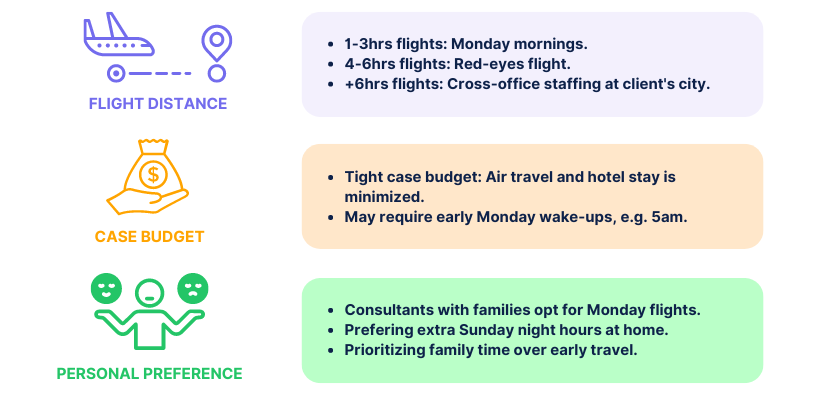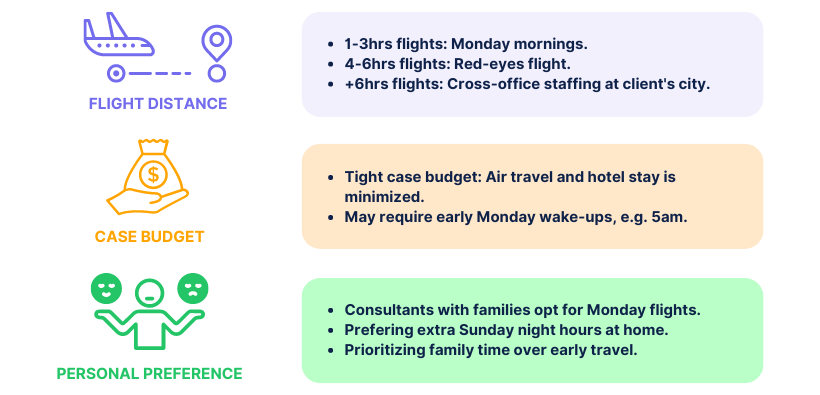Since you have to be available for the client, flying is a matter of course in the consulting industry. The following article gives insights into flight statistics from our expert Agrim, so you know roughly what to expect. Moreover, the coach differentiates between start-of-the-week flights and end-of-the-week flights. Agrim also explains exactly what you need to look out for to ensure that your flight runs smoothly. His tips will prepare you perfectly for your next flight! ✈️🌎
Consulting has traditionally been a traveling profession. The core responsibility of the job is to become a “trusted” advisor to the client. That requires direct engagement with the client and their team. And that means the consultant needs to be wherever the client is.
The client can be in the same city, a different city, or even a different country. Hence, the life of the consultant is very much governed by how far the client is.
- If the client is in the same city, then your daily commute is between your home and the client's office.
- If the client is in a different country, most likely you stay out of the country from Monday morning to Thursday evening, and sometimes even Fridays.
- The middle ground is trickier. If the client is about 2 hours away by car. In that case, both models exist. Single people typically go for the hotel stay option to rack up points, while married people are more likely to choose to sleep at their homes.
For my time at BCG Dubai, my estimated travel stats stand as follows:
- Air: 200+ flights and 750+ hours in the aircraft. Most flights were 2-3 hours long, some were transcontinental.
- Stay: 600+ nights spread across 20+ hotels. Most stays were 3 nights long.
- Land: 1,000+ cab rides to commute from the hotel to the client.
This was the way, at least until COVID hit. Now, there are many changes in the system. Some offices have broken up into smaller offices for sub-regions (such as middle-east), while some are beginning to resume full travel. It was very inspiring to see the flexibility with which consulting firms and all their employees adapted to the changing demands of the pandemic.
Nevertheless, for the consultants who are still going to be traveling, this article presents a good picture of what happens in a typical week.
Start of the Week - Flight
Typically you take an early morning flight on Monday or a late night flight on Sunday. This depends on a couple of things:
Flight Distance
Short flights (1-3hr) mean that Monday mornings will likely be the case. 4-6hrs and you are looking at red-eyes. If your client is based further away than 6 hours, you will most likely be stationed in the client city on a continuous basis for the duration of the project. This is commonly known as cross-office staffing.
Case Budget
If the case budget is not enough, most likely the partner will try to minimize the air travel and/or the hotel stay. Most likely the hotel stay. So, you might have to push yourself into waking up at 5am on a Monday.
Personal Preference
Family-bearing consultants would prefer a few extra hours of time at home on a Sunday night and hence choose the Monday flight.
End of the Week - Flight
There is more variability on the return leg. Usually the return flight is on a Thursday - so that the team can work in the home office on Fridays. This is always a much preferred retreat. It allows consultants to socialise in the office, file expenses, spend an extra day home, wake up to their family, and much more. Flight times are picked based on client schedules. Sometimes it can be early evenings and sometimes in the night.






